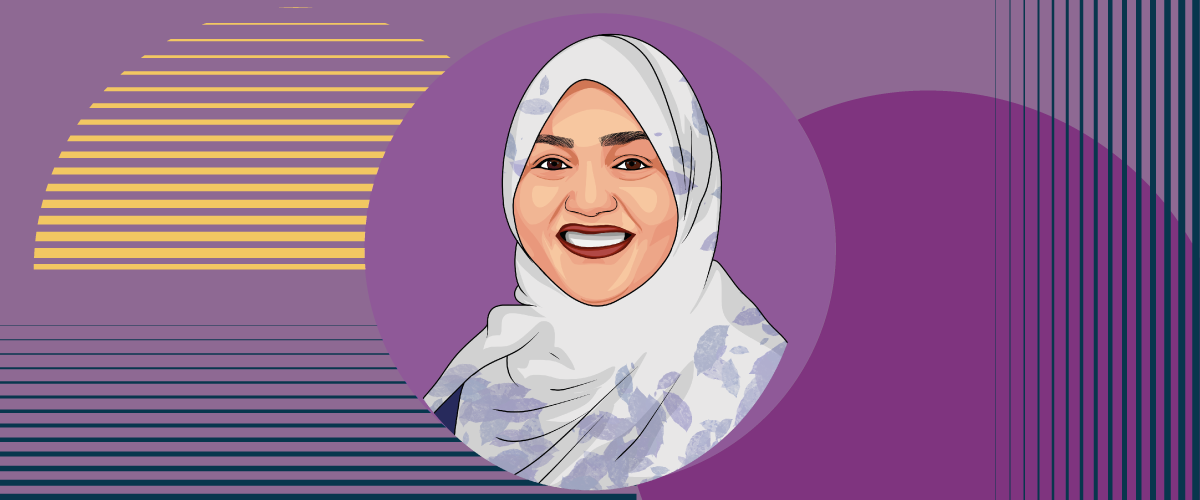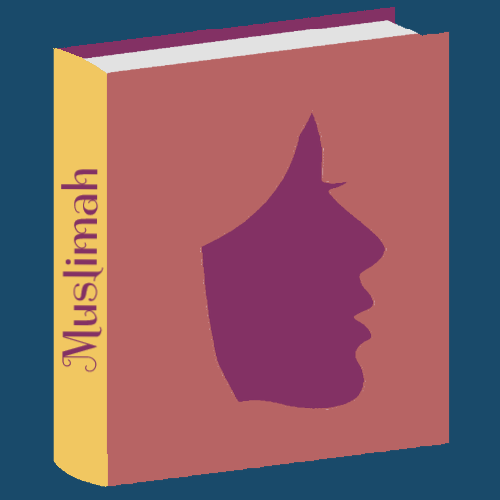
Where do I Belong? — Wisam Osman
—by Nasreen NasreenBorn and raised in a picturesque small town, Salalah, in the Sultanate of Oman, Wisam Osman took pride in her identity as a Nubian Sudanese. She had travelled to Northeastern Africa several times when she was young to visit family in Sudan. Wisam’s parents, born and brought up in Sudan, ensured all six of their children were connected to their Sudanese roots. However, there were times when Wisam felt something was amiss. Although she could never put a finger on what it was until later in life.
Growing up, Wisam had everything she desired. A beautiful house surrounded by nature on all sides, loving parents and siblings, and an opportunity to make friends at school. She enjoyed going on long trips and adventures with her family. Wisam’s eyes light up when she talks about her childhood. “I could not have asked for more. When I think of my childhood, I know I want to follow my parents’ style of parenting. They tried their best to provide us with a better life. They never differentiated between my brothers and me, and we had the same opportunities as my brothers did. We were all one big happy family.”
When it was time to go to university, the University of Oman was not an option since admission was only open to citizens. At that moment, Sudan seemed like the right place to be for higher education. Wisam recalls that her mother maintained a small corner in the house that was always decorated to remind them of their Sudanese culture and who they were. The family of eight always spoke in Sudanese dialect at home. Wisam, who was proud of being Sudanese and felt a deep connection to her motherland, wanted to go to Sudan for her higher education.
In 1996, Wisam moved to Sudan to pursue a bachelor's degree in Computer Science and Statistics from the University of Khartoum, followed by a master’s degree. Sudan opened a whole new world to her. During the first week on campus, Wisam tried her best to make as many friends as possible. It wasn’t as easy as she had thought it would be. While Wisam was Sudanese, she barely knew the ways of the country. She had a difficult time reading people and learning how to social with them — something one could only learn if they have lived in the country.
As the smile slowly fades from Wasim’s face, she discloses, “If you are residing in the Gulf area — you are a foreigner. You would think when you go back to your country the people would accept you. But that’s not the case. When ‘foreigners’ go back to Sudan — we are called the ‘spoiled ones.’ We know nothing. I always hid that I did not grow up in Sudan from everyone. If I heard a phrase I didn’t understand that someone in my class used, I would never react. I would go home and ask my friends, older sister or relatives for the meaning of it.”
Two years after Wisam moved to Sudan, her father fell ill. He decided to move back to Sudan since he wanted to be close to his family and be in his home country. “My father never wanted Omani nationality. He was so proud of his own culture. His heart was always in Sudan. So, when he fell ill, my family moved back to Sudan. It was a hard time. My mother and I had to take care of the entire family. Since I had already been in Sudan for two years and had learned the country's ways, everyone depended on me. It was a big transition for all of us. But I always look at the positive — God gave me a chance to be with my father and spend quality time with him that I cherish to this day.”
While taking care of her family, Wisam continued her education and earned her bachelor's degree and decided to pursue her master's degree in Statistics Science immediate after graduating. However, in 2004, Wisam's father passed away. With her father's passing, Wisam's family started to leave the country. “Sudan is not where we grew up. The quality of life was different. Life in Sudan, an impoverished country, was harsh. When my father was sick, we had money but good medical services weren’t available. Even if you had money, the quality of life was not the same as back in Oman. Who would want to stay in a situation like that? Deep inside, we all knew our life in Sudan was not going to last.”
“After moving to Sudan, I realized I did not belong in Oman, but neither did I belong in Sudan. Where did I belong? I could not put a finger to where my home was.”
So, when Wisam's aunt invited her to visit Italy, Wisam readily accepted the offer. Within a few weeks, Wisam started working with the United Nations as a statistician. While she stayed in Italy for four years, Wisam knew this was not a place where she wanted to spend her life. “It's a beautiful country. But again, Italy was not home. The culture was entirely different from anything in either Oman or Sudan. Within the first month of being in Italy, I knew this was not where I wanted my roots. It was hard to be my true self in that country.”
During this time, Wisam was introduced to her husband-to-be online by a relative based in Canada. He was based in Canada. The two started having conversations to know each other better. Both Wisam and her husband-to-be wondered how to get to know each other better since they had never personally met. They believed the best option was to ask each other random questions — anything that came to mind. “One day, I was having a conversation with my aunt about what would make a marriage succeed. What is more important — love or respect? My answer was respect. If there's love but no respect, your marriage would not work. I asked my now-husband the same question, and when he answered exactly the same way as myself, that's the moment it clicked. I knew this was the man I wanted to be with.”
Wisam and her husband were married soon after. Wisam's face lights up as she recalls the day of their wedding. The Nikah* ceremony took place In Sudan where both families came together to complete the religious and civil marriage’s process. Wisam and her husband were not able to attend the Nikah ceremony in person. While Wisam was still living in Italy, her husband was in Canada. Three months after their Nikah, both flew back to Sudan for a lavish wedding reception. Having lived in Italy for almost four years, Wisam had never visited Venice. She knew it would be with a special person if she ever decided to go there. The couple left for Venice for their honeymoon following their wedding reception.
The smile on Wisam’s face slowly vanishes as she speaks about the difficult decision she had to make to move to Canada. “I was worried about coming to Canada. I did not know the country. I did not know what I would do when I had children. How would I even understand what my children were experiencing in school? Or how to help them? How will I raise my kids in a country that I know nothing about? Deep down, I also knew I did not want my children to move around from one country to another as I did. I wanted them to have a place they could call home. I wanted them to have the home I did not have all my life. If they were Canadian, no one will call them foreigners or treat them differently. And hence, the decision was made to move to Canada.”
In 2008, Wisam moved to Canada to be with her husband. Three years later, Wisam was introduced to the Coalition of Muslim Women (CMW). She saw an event on Facebook asking women to join a dialogue. “I wasn’t involved with what was happening around me much. I was new to the country, and I was busy making friends and getting to know people in my community. I was more involved with my social culture and was unaware of the political scenario in the country. I did not respond to the dialogue invitation. And I regret that I wasn’t part of the CMW in the beginning.”
In 2011, one of Wisam’s friends told her about the CMW. Wisam had been extensively involved in volunteering with the Sudanese community. Wisam readily agreed to the prospect of volunteering with the CMW. “When you hear the name the Coalition of Muslim Women, you would think it’s a religious organization. But that’s not what it is. There’s so much more to CMW.” Wisam got a call the next day and was asked if she would be interested in organizing a party for the volunteers. “I was taken aback. How does a Muslim women’s organization talk about a party. Did I hear it right?” But, of course, Wisam was in for the challenge! Along with several other volunteers, she organized the event. And from that day on, she fell in love with the CMW.
“With so much wrong happening in the world, I wanted to do my part and speak up against human rights violations. The CMW gave me that space. I truly found myself with this organization. This is where I belong, and this is where I should be. I worked but was never tired. I was always excited to be part of any meetings or activities. I learned to be culturally sensitive after meeting so many different women from different countries and cultures. The CMW became a part of my identity.”
After becoming an active member with the CMW, Wisam built her skills and gained a lot of experience that helped her to find a job later. “I had a lot of work experience outside of Canada but not in Canada. The CMW helped me gain that experience. My work before coming to Canada had no meaning here.”
Wisam went on to work as the volunteer director of the Fund Development Committee for the CMW. She organized several events for the organization. This experience helped her to get her first job with Carizon, a counselling agency based in Kitchener. “It was my first interview with any organization in Canada, and I got the job! I owe the CMW. It’s almost like I am taking care of the CMW, and they are taking care of me. As time passed and the CMW grew, Wisam was hired as the coordinator for the violence-free homes project with the organization.
Happy and content with life, Wisam says there is only one thing missing. It’s her dream to go back to Salalah one day with her three children. She wants them to experience the beautiful childhood she had. The family of five plans to visit when the time is right.
“There’s just something about home — that warmth and comfort. Canada feels like home. The person I love is here. My children are happy. I have the big family that I always longed for. I belong to this country, and I can proudly say I have a home now.”
* The Nikah is a religious ceremony for a Muslim couple to be legally wed under Islamic law.
